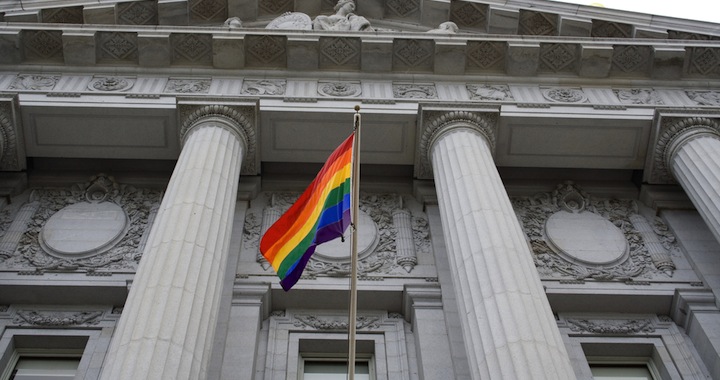This morning, SCOTUS announced that the so-called Defense of Marriage Act (ironically signed into law by Bill Clinton during his two-term presidency) is ‘unconstitutional as a deprivation of the equal liberty of persons that is protected by the fifth amendment…DOMA singles out a class of persons deemed by a state entitled to recognition and protection to enhance their own liberty.’
The federal Defense of Marriage Act (DOMA) defines ‘marriage, ’ for purposes of over a thousand federal laws and programs, as a union between a man and a woman only.
Today SCOTUS ruled by a vote of 5-4 that the law is unconstitutional . The court explained that the states have long had the responsibility of regulating and defining marriage, and some states have opted to allow same sex couples to marry – to give them the protection and dignity associated with marriage.
By denying recognition to same-sex couples who are legally married, federal law discriminates against them to express disapproval of state-sanctioned-same-sex marriage.
In other words, same-sex couples who are legally married will be entitled to equal treatment as married opposite-sex couples under federal law – with regard to, for example, income taxes and social security benefits.
Though there are questions surrounding the implication of the SCOTUS decision on Proposition 8 and its effects for states with same-sex marriage bans, the immediate result is that after years of fighting legal battles, marriage equality has returned to California.
Related: Supreme Court Debates Same-Sex Marriage – Should We? by Micah Bales
In the case of Proposition 8, the US Supreme Court has opted out of sitting in the hot seat by making a finalized, nation-wide ruling on the culturally divisive issue of same-sex marriage bans. Instead, they have determined to kick the issue back to individual states, allowing each to remain free to either allow or ban same-sex marriage.
Yet the ramifications of the SCOTUS decisions are monumental, and point to the inevitable reality that same-sex marriage will likely be legalized in every state.
It’s merely a matter of time.
Some will consider today’s ruling a victory; others, a defeat. The reality is, it is neither.
The SCOTUS decision is an opportunity.
It is an opportunity to build bridges across a cultural divide that has for far too long split the conversation into ‘us versus them.’ No matter what your position on the SCOTUS ruling, there is an even more supreme law – the Law of Love.
Regardless of one’s political, social or religious convictions on the topic of same-sex marriage, Christians have a responsibility and a duty to live into the unconditional love of christ which we claim to represent.
The mistaken assumption in contemporary society is that we all have to agree in order to love well; including the ability to love well within the spaces of equality, rights, legality, relationship, religious freedom and dignity (each of which comes into play in this conversation and the SCOTUS decision).
And we don’t all agree.
But the reality is, disagreement does not dictate disrespect or dissent. everyone does not have to agree in order to love well. Differences in cultural, political or theological belief systems do not necessitate aggressive lobbying or campaigning against another person or group of people. It is possible to disagree while dignifying and legitimizing other individual’s experiences.
The question, then, is how should the Church respond?
Rather than fighting to convince, pressure or persuade people to my preferred theological perspective, I am more interested in learning how to live out the principles and teachings of Jesus in the midst of cultural divisions and an inevitable change in cultural perception concerning the definition of marriage. While some argue that it is a duty and responsibility to fight to preserve a traditional definition of marriage at the expense of the rights and equal treatment of others, I prefer a different approach.
Also by Michael: RIP, Rob Bell
In following the example of Jesus, I see our responsibility tilted toward reconciliation. Treating others the same way we would want to be treated. Standing in solidarity with the Other. Living at peace with people, regardless of whether we agree with them or not. To love our neighbors. But maybe that’s just me.
What do you think?
—
Michael Kimpan is the author of the WayWard follower blog, a site designed to inspire thoughtful conversation and movement among followers of Jesus Christ. Michael works with The Marin Foundation in Chicago, a non-profit organization which works to build bridges between the LGBT community and the Church.
Ads by Google

